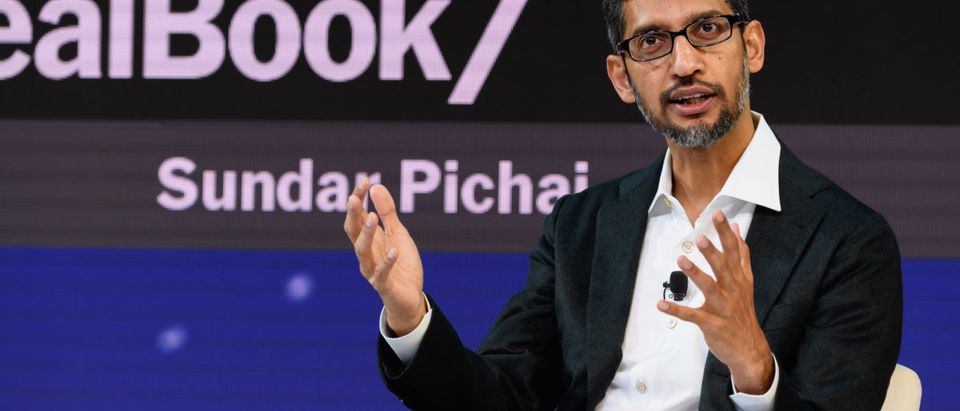The latest earnings report from Alphabet, Google’s parent company, demonstrates that the company is still a cash cow, but it does nothing to allay fears about the intrusive role “big data” plays in our lives. Nor does it provide respite from serious credibility problems facing the company’s leadership.
For instance, Google CEO Sundar Pichai may have lied to Congress. Pichai testified in December before the House Judiciary Committee, where members grilled him about transparency, data collection, and how Google filters search results. Moreover, several Republican congressmen wanted answers about political and ideological bias.
The plaintive Pichai was unequivocal. “We don’t manually intervene on any particular search result,” he claimed, because of the massive scale of trillions of searches each year. “It is not possible for an individual employee or groups of employees to manipulate our search results.”
However, according to an internal discussion thread leaked by an anonymous company employee, human beings intervene in searches on a consistent basis, especially on YouTube, a subsidiary of Google. The company allegedly maintains a “blacklist” file for “controversial” terms that result in down-ranking for conservative and libertarian sources, and “whitelists” that boost positive results for liberals such as California Rep. Maxine Waters.
“We have tons of white- and blacklists that humans manually curate,” one of the company’s engineers wrote on the discussion thread. “Hopefully this isn’t surprising or particularly controversial.”
For members of Congress who Pichai told the practice didn’t exist, it likely is surprising and controversial. Look for him to be called back to Washington for follow-up questions this year. “If Mr. Pichai lied to Congress, he was under oath and it would be a criminal matter for a grand jury,” said Republican Rep. Louie Gohmert of Texas, a former chief justice on the state’s Court of Appeals.
Questions about Pichai’s veracity are fueled by the mystery surrounding Project Dragonfly, a search engine Google is developing for use in China. Human rights groups, members of Congress, and Google’s own employees have expressed concern that the company aspires to become a partner of Chinese president-for-life Xi Jingping in building his digital dictatorship.
Pichai had weasel words for the Judiciary Committee, asserting that “right now” there are “no plans” to launch a search engine in China. Yet Google has devoted significant resources to it, with more than 100 employees at work, according to Pichai. He characterized Dragonfly as a project pursued “internally” and not “in China,” but all the secrecy conveys something more serious.
Thousands of Google’s own employees have signed a letter that demands Google cancel Dragonfly, which they said “enables state surveillance” by linking searches to phone numbers. And human rights advocates — under the umbrella of a Stop Google Censorship campaign — recently protested at Google offices in 10 countries.
“Every time Dragonfly was brought up (in the committee hearing) it was said that the company was not currently developing ‘at present’ or ‘right now’… so what that led us to believe is that they’ve temporarily put the talks on hold but they haven’t cancelled the project,” said Gloria Montgomery, UK Director of the Tibet Society.
Another coalition of human rights groups this month joined together to urge Pichai not to sell its facial recognition technology to any government, for obvious reasons. Google has said it will not do so “until the technology’s dangers are addressed,” which isn’t especially comforting coming from Pichai.
All of this occurred against the backdrop of Google paying millions of dollars to executives who were credibly accused of sexual harassment to get them to leave. Now the payouts are the subject of a shareholder lawsuit over the post-settlement devaluation of the company. (The National Legal and Policy Center, which I chair, has submitted a shareholder proposal on the company’s response to sexual harassment to be considered at Alphabet’s 2019 annual meeting.)
Pichai is a Tamil Indian who came to the United States to attend Stanford and Wharton. Alphabet’s success made him a billionaire. You would think this would prompt a special enthusiasm for this country and its institutions. Instead, either out of conviction or by necessity, he embraces Silicon Valley’s cultural hostility to the rest of the country, most famously firing the Google engineer who dared to observe that there are differences between men and women.
Lauded as creators and innovators, Silicon Valley CEOs have led a charmed existence. The company spent $600,000 in the most recent fiscal year alone on Pichai’s personal security. His isolated splendor, however, cannot last long. With his evasions and obfuscations, he comes off as more villain than visionary.
Resentment of the technology plutocrats is mushrooming. Big Data has suddenly become a threatening and ominous force to be feared. Because of its near-monopoly, Alphabet will increasingly be the focus of this fury. As long as Pichai is Google’s public face, popular perceptions of the company are only going to get worse.
Peter Flaherty is chairman of the National Legal and Policy Center, an organization promoting ethics in public life through research, investigation, education and legal action.
The views and opinions expressed in this commentary are those of the author and do not reflect the official position of The Daily Caller.


